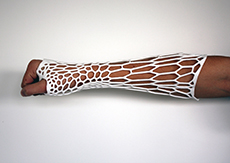Cast design headed for international competition
 School of Design graduate Jake Evill has won the New Zealand section of the James Dyson Award with his Cortex Cast design.
School of Design graduate Jake Evill has won the New Zealand section of the James Dyson Award with his Cortex Cast design.
Jake's design will now progress to the international competition in November. More information about the James Dyson Award can be found on the award website.
The following article about Jake's win was published by the New Zealand Herald online on August 22.
Kiwi's cast wins major design prize
The days of using a ruler to scratch beneath a plaster cast may be over, thanks to this year's winning invention in the New Zealand leg of the James Dyson Award, a global product design competition.
The winning design is a lightweight, no-itch nylon cast for broken bones, designed to replace the traditional plaster cast.
The 21-year-old designer, Jake Evill, was inspired after the frustration of wearing a cast when he broke his hand.
"Wrapping a broken or fractured arm in two kilos of clunky, soon to be smelly and itchy, plaster in this day seemed archaic to me,'' Mr Evill said.
His radical solution involved using data from both an X-ray and a 3D scan of the patient's fracture to create a custom-made cast.
The cast, named Cortex, is then printed using a 3D printer, and creates a snug, breathable fit.
The spiderweb-like membrane means the waterproof cast is well ventilated, and printed reinforcements mean the cast is strongest where the bone is broken.
Head judge David Lovegrove said the judges were unanimous in their decision, and the design embodied what the awards were all about.
"It has been the toughest judging year yet, though Cortex came out marginally ahead due to its global reach in improving many people's lives,'' he said.
The design may provide a real revolution in the way broken bones are treated, Mr Lovegrove said.
"Cortex is the re-imagining of the traditional plaster cast. It is a quite different take on what digital manufacturing can offer and could well change the way broken bones are treated in the future. It offers people with broken bones real benefits in terms of weight, comfort and convenience.''
As part of the prize package, Mr Evill has won a trip to the London Design Festival with $3,000 in travelling expenses and accommodation. He will meet key members of the British design community.
Ten New Zealand entries, including Cortex and the two national finalists, will progress to the international James Dyson Award competition and could win the equivalent of NZ$73,000 to help commercialise their ideas.
